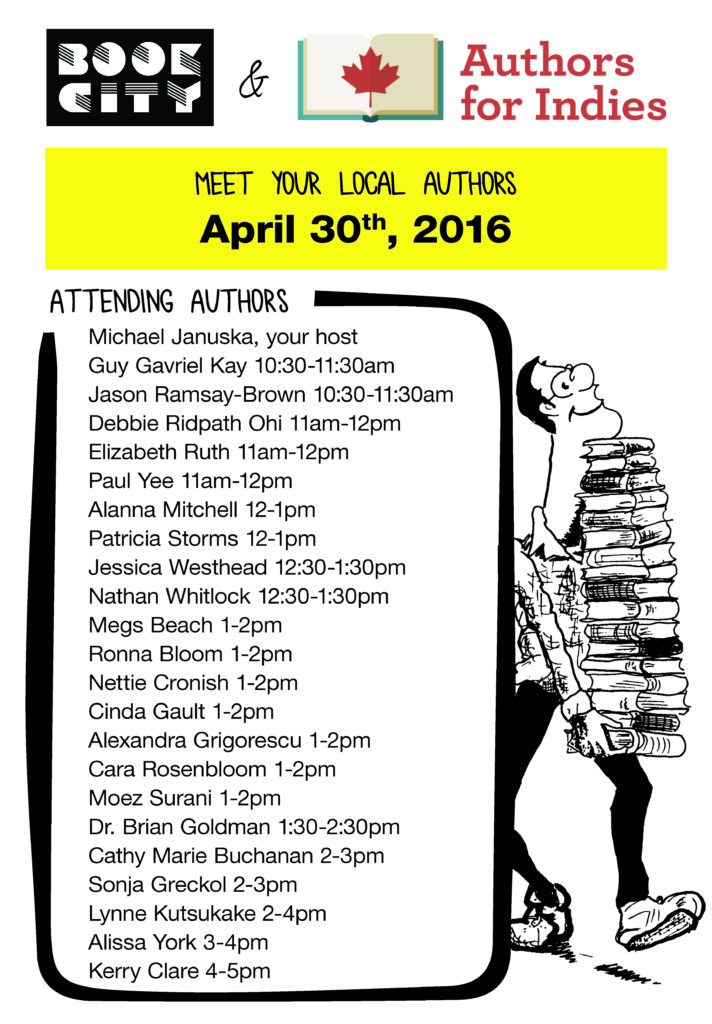April 26, 2017
Authors for Indies!

Saturday is the third annual Authors of Indies Day, and I’m doing something a little bit different this year, namely hitting the road for a little bookshop discovery. Alongside bookish dynamos Kate Hilton, Karma Brown and Jennifer Robson, we’ll be driving out of town and landing as follows:
- Curiosity House Books & Gallery in Creemore, 10:00 – 11:30 am
- Forster’s Book Garden in Bolton, 1:00 – 2:30 pm
Hope to see you there. And if you won’t be there, check out the other Authors for Indies events going on in your neighbourhood.
December 5, 2016
The Toronto Review of Books’ Seasonal Affective Party!

I’m looking forward to reading as part of the Toronto Review of Books’ Seasonal Affective Party on Tuesday December 6, 7pm at Poetry Jazz Cafe in Kensington Market. I’ll reading alongside Andrew Pyper, Trevor Corkum, and Catherine Graham. TRB Managing Editor and novelist Damian Tarnopolsky will be reading too, along with TRB Senior Editor and writer Kelli Deeth.
The Facebook event is here! See you there?
I’ll be reading the infamous pork shoulder scene from Mitzi Bytes, and it’s going to be great.
November 18, 2016
Missing Nimama

Congratulations to Melanie Florence and Francois Thisdale, whose hauntingly beautiful picture book, Missing Nimama, about a murdered Indigenous woman won the TD Children’s Book Prize last night at The Canadian Children’s Book Centre Awards. This book is an extraordinary demonstration of what the picture book can be and do; you can read my review here. I’m also thrilled for Danielle Daniel who won the Marilyn Baillie Picture Book Prize for Sometimes I Feel Like a Fox, another book we’re big fans of at our house.
A complete list of winners is here. It was a terrific night.
May 31, 2016
Books on Ontario Morning
 Tomorrow morning I’ll be talking about books on CBC Ontario Morning at 8:20. I am ridiculously happy about the stack of books I’m recommending, because the easiest thing in the world to do is convey enthusiasm for things you’re actually enthusiastic about.
Tomorrow morning I’ll be talking about books on CBC Ontario Morning at 8:20. I am ridiculously happy about the stack of books I’m recommending, because the easiest thing in the world to do is convey enthusiasm for things you’re actually enthusiastic about.
Hope you’ll listen in.
May 29, 2016
Alone in Montreal

I’m not alone very often, and when I am, I am never lost or aimless. I say this not smugly, but as a mild lamentation. I don’t know that I’d like being alone, lost and aimless to be a pastime, but sometimes such things can lead a person places. This is what I teach in my blogging course, that a blogger needs space to roam, room to wander. And on Friday, I had some of that for myself, as I flew to Montreal to talk about blogging with the Association of English Language Publishers of Quebec. If you know me, you know I rarely leave my couch, so this was a pretty novel opportunity. I flew out from the Island Airport on Friday morning, the whole experience infused with goodness from the get-go—tea, ample leg-room and a good book. A whole hour and a bit in which to read.
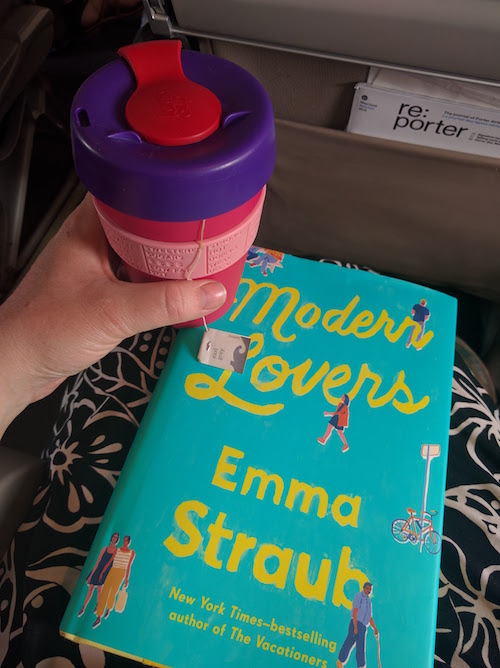
I had a few hours to kill before my event, so I made a plan to explore the Mile End neighbourhood and then make my way through the city to Westmount, where the AELAQ event was being held. My taxi from the airport dropped me off at Librairie Drawn and Quarterly, which immediately landed a space on my Best Bookshops I Have Ever Been To list. A world-famous publisher of amazing graphic novels and comics, they sell their own books, as well as other such books from other publishers, and then kids books, poetry, fiction, cookbooks etc etc making them a perfect general-interest/speciality hybrid. I walked in there and contemplated never leaving.
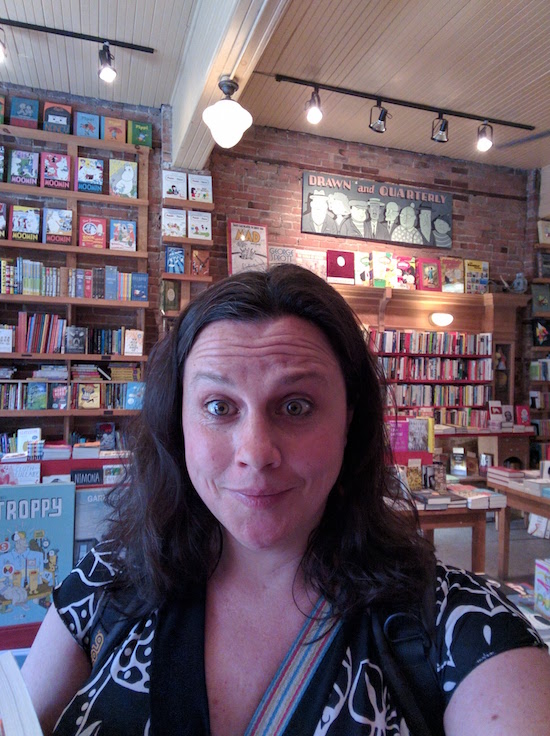
I ended up choosing Rivka Galchen’s Little Labors, which is SO GOOD and I read yesterday. I thought maybe I was through with moms making sense of the new baby books, but no. Looking forward to writing about this one more this week. I also got Photobooth: A Biography, by Meags Fitzgerald, and it’s brilliant. The rest of the books were for my family, and I think I chose very well.
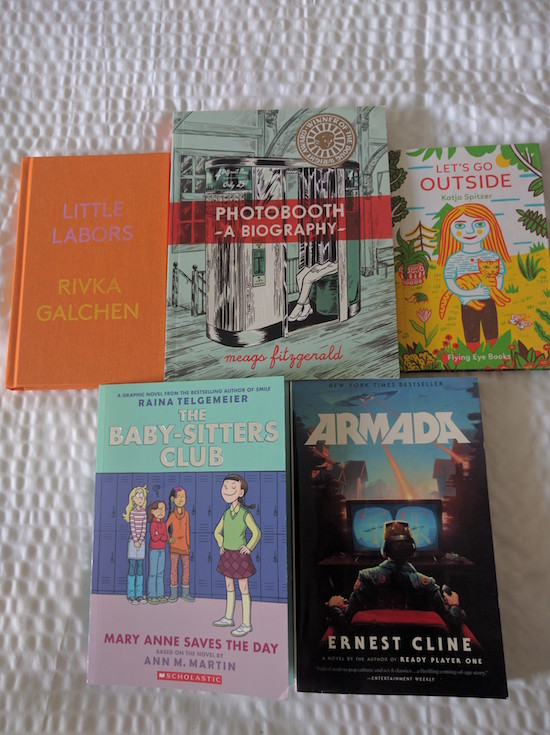
So of course this meant I had a pile of books now to add to all the stuff I had to carry, and although I have never, ever complained about carrying books (the most pleasurable burden I’ve ever had the privilege to experience), my load in general was kind of heavy. It was also 38 degrees outside (no lie: factoring humidity), but no matter, I was on my way. I felt more like Mary Tyler Moore than I usually feel ever, if she’d been making it after all in French Canada whilst carrying a stack of books. I hit up a boulangerie, and got a croissant, and then followed it up with an ice cream cone at Kem CoBa, double scoop because you only live once. And it was so hot that my ice cream was melting faster than I could eat it, and I do appreciate that Montreal was so kind to me in spite of the melted diary stains all over my bag. After that, I added a dozen bagels from Fairmount Bagel to my load, and then set off down Rue Saint-Urban toward my final destination.
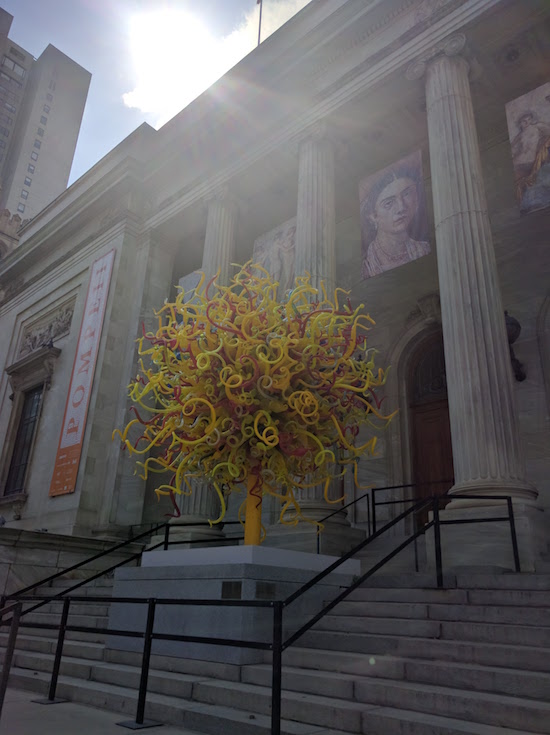
It seemed ridiculously hot, though I think the heat (and the books. and the bagels) were the problem, plus I had to wear a giant shirt because I continue to be allergic to the SUN. I walked through Jewish neighbourhoods, a Portuguese neighbourhood, skirted the park and the mountain, and then arrived downtown where I turned and walked along Rue Sherbrooke, though the McGill Campus and past museums and galleries and there was so much to see..and I was so very hot and did not seem to be arriving at my hotel ever. So I had to stop and steal wi-fi from the Ritz Carlton (whose signal is very strong, stretches all the way across the street) to figure out where I was going. Luckily the right way. I got there eventually, to my hotel with enough time to cool down and change my clothes and iron my dress and be ready for my presentation, which was not far away at the Atwater Library.

As would be apt for a presentation about how blogging in 2016 is small and focussed, the group that arrived for my presentation was much the same—and they were WONDERFUL. I had such a wonderful time giving my talk, and the group was so receptive, and I was pleased to meet some people again, meet others for the first time, and in particular people whom I’d grown to like already in engaging with them online. It was a terrific experience, and such a privilege to be there. And I was so appreciative to everybody for making me feel so welcome. (And for coming, even though it was by then the middle of a rainstorm and thunder was rumbling outside).
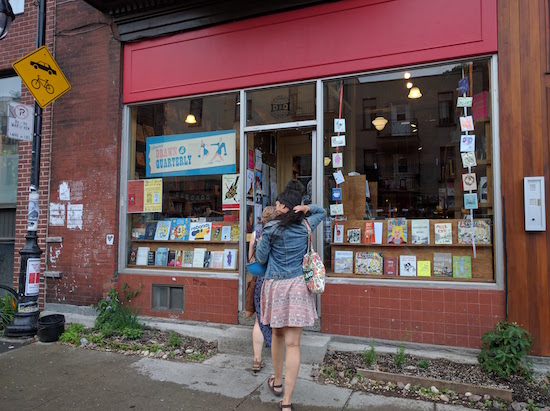
Afterwards, a few of us piled into a taxi and headed back up to Drawn and Quarterly for the Biblioasis launch of books by Alice Petersen and Catherine Laroux. It was a pleasure to be back there and also to have it all set up for an event, and to meet other local writers and readers and get a feel for the Montreal English literary scene. I was so happy to hang out with Saleema Nawaz, who contributed to The M Word and who i’ve long admired, but had really only met fleetingly, and also Elise Moser (who has a new nonfiction children’s title coming out in the fall about “the pioneer of plastics recycling”) and Alice Zorn (whose latest novel, Five Roses, I am so excited to have ahead of me). The readings were great, and then afterwards, we went out for dinner and drank bourbon lemonade and ate fried chicken and nothing annoying or not wonderful had happened to me all day (nearly collapsing from heat stroke notwithstanding). It was nice to be alone in Montreal, particularly in those moments when I actually wasn’t.
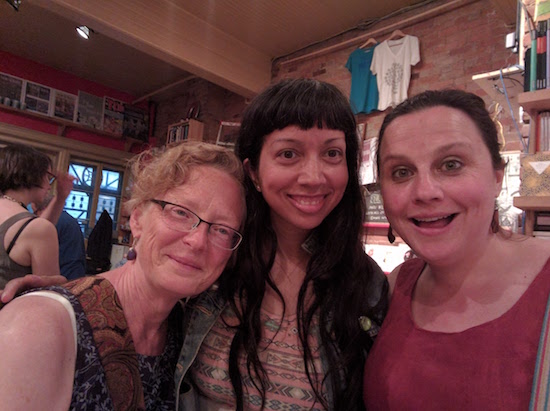
Spending the night in a hotel room BY MYSELF (without even sand in the bed. I like holidays, but the bane of my existence is sand in the bed, but there were none in this one) was a ridiculous indulgence, so surrounded was I by good pillows, clean sheets, a comfortable mattress, and many many books. Once I stopped reading I slept soundly, and then spent the morning enjoying a few good hours of quiet and aloneness before it was time to fly back home again.
May 22, 2016
Montreal!

I’ll be in Montreal on Friday talking about literary blogs in 2016 (“now that the bubble has burst…”) with the Association of English-language Publishers of Quebec. I would love to see you there!
May 9, 2016
The Festival of Literary Diversity
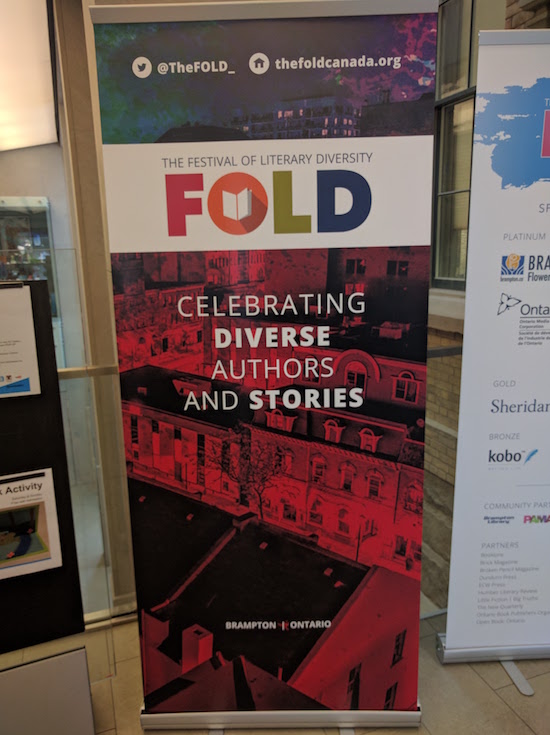
Warning: There’s gonna be typos, as I translate my pages and pages of handwritten notes into a blog post. Forgive me, please?
From the start, The Festival of Literary Diversity (FOLD) seemed to me like a most inspired idea, one whose time was exactly right, although my enthusiasm was mostly theoretical. Because, and here’s my confession, for all my lit championship, there are few events I’d choose to attend over, say, staying home and reading. I don’t need to discover new books and authors, I feel connected enough to the literary scene, and I’d rather read an author’s work than hear her answers at a Q&A.
But then the FOLD rolled out their schedule, and I was as excited as I was impressed. Not only did it seem like something I should go to, but now I actually wanted to. I’ve been going to literary festivals for years, but these were panels apart from anything I’ve ever attended before. These sessions were asking questions whose answers I had no idea about—what an incredible opportunity for learning. There were also writers whose work I was familiar with, but others I hadn’t encountered before. I knew that I absolutely had to be a part of it, and it was pretty easy to find three writer friends who wanted to come along.
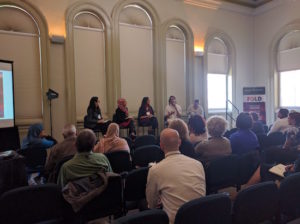 Although we took a wrong turn off the 410, so were late for the Faith and Fiction panel. As we walked in, Zarqa Nawaz (author of the memoir Laughing All the Way to the Mosque and an actor from the TV series Little Mosque on the Prairie) was discussing the universal struggle for social justice, how it was not just particular to faith communities. She gave the example of women who are restricted from attending school in France because of wearing religious dress—secular and fundamentalists both, she explained, are capable of denying a woman eduction due to dogmatic beliefs.
Although we took a wrong turn off the 410, so were late for the Faith and Fiction panel. As we walked in, Zarqa Nawaz (author of the memoir Laughing All the Way to the Mosque and an actor from the TV series Little Mosque on the Prairie) was discussing the universal struggle for social justice, how it was not just particular to faith communities. She gave the example of women who are restricted from attending school in France because of wearing religious dress—secular and fundamentalists both, she explained, are capable of denying a woman eduction due to dogmatic beliefs.
Cherie Dimaline (an award-winning Métis writer whose most recent book is the short story collection A Gentle Habit) told us that for her, stories themselves were a faith, and that repetition was used in storytelling as a way to keep the stories, “to develop the brain like a beehive,” she said. She’d been selected in her family when she was young as a story-keeper and her responsibility in this respect is to the seven generations before and after her, to reach back and also reach forward.
Ayelet Tsabari (author of The Best Place on Earth) continued this connecting of faith and story. In order to write, she explained, you need a tremendous amount of faith—in one’s self, in the reader and also in the possibility of fiction changing the world even in the smallest ways. “You can write fiction without faith,” she said, “but it’s much harder.” And then she noted how for her, writing was very much a spiritual practice, with ritual, an insistence on objects, and a whole lot of praying. “Aside from parenthood,” she explained, “[writing] is the one thing I take seriously, where I find meaning.”
Nawaz talked about Muslim women and victim literature. “A boring suburban life was really radical for a Muslim woman,” she noted. In publicity for her work, she finds herself being defined as someone belonging to a violent faith that doesn’t believe in comedy. She tries to find a way to talk about her community in ways that are fair and also challenge stereotypes. An interviewer in the US mentioned responses to Little Mosque on the Prairie, and Nawaz countered that with Christian responses to the film The Last Temptation of Christ, or the furor when Sinead O’Connor ripped up a photo of the Pope on TV. “There’s cultural amnesia,” she said. “The examples are everywhere.” The stereotypes are so entrenched, but it ultimately it all comes down to the fact that people everywhere are all the same.
Dimaline continued the thread about stereotypes and their entrenchment. People, she said, can be upset when their expectations are disrupted. Her novel, The Girl Who Built a Galaxy, begins with a girl and her grandfather, familiar territory for a Indigenous story. But then it takes a twist and the girl ends up in New Orleans, which threw a few readers. “‘Where’s her canoe?'” Dimaline has her hypothetical reader asking, answering that reader’s question with, “You know, we also exist outside your imaginations.”
“Writing,” says Dimaline, “is the last true magic. Imagine being able to create something out of nothing,” and that something is what literature is. It takes faith to create it, and also to receive it.
Moderator Eufemia Fantetti asked about criticism of writers’ portrayal of faith. “I try to listen to feedback,” answered Vivek Shraya, the multidisciplinary artist whose latest book is the poetry collection even this page is white. The feedback is not always useful, but can be, says Shraya, as she embarks in work like her recent work, She of the Mountains, which reimagines Hindu mythology through a feminist lens. She went on to talk about the importance of not underestimating one’s audience. It’s been tricky having a book about queerness with “God” in the title, but sometimes, she said, you have to trust your muse. And people have connected with these stories in all kinds of surprising ways. Diverse books are important because people get to see their own experiences reflected, but these books are also good for readers who can connect with different perspectives.
Tsabari said that the story she was most afraid to publish for fear of controversy (the story of an Israeli woman who comes to Canada to meet her new grandchild, and discovers the boy will not be circumcised) was the one which has received the most overwhelming emotional response. That often a writer has to write about what scares her. And the stakes seem even higher now as her book is about to published in Canada. “It’s all scary,” she said. “That’s why we need faith.”
Both Nawaz and Dimaline talked about how the threat of right-wing tyranny has galvanized their respective communities, Nawaz in response to 9/11 and Dimaline with Idle No More, and has had Muslim and First Nation communities come out of isolation and begin to engage, to shape their own narrative after years of invisibility.
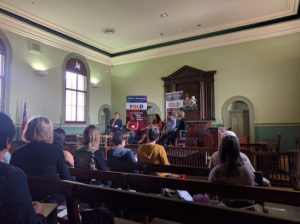 Next up was the Powerful Protagonists Panel with Brian Francis (Fruit, Natural Order), Sabrina Ramnanan (Nothing Like Love), Waubgeshig Rice (Legacy), and Heather O’Neill (The Girl Who Was Saturday Night, The Daydreams of Angels). Each author read from their recent works, and then a discussion began, moderated by Aga Maksimovska.
Next up was the Powerful Protagonists Panel with Brian Francis (Fruit, Natural Order), Sabrina Ramnanan (Nothing Like Love), Waubgeshig Rice (Legacy), and Heather O’Neill (The Girl Who Was Saturday Night, The Daydreams of Angels). Each author read from their recent works, and then a discussion began, moderated by Aga Maksimovska.
His own powerful protagonist, said Francis, was born of his interest in older generations and the way they kept private and personal stories close, linked to pain and shame. What if, he wondered, he wrote a character who tried to escape from that?
Ramnanan’s protagonist was one who, after a sudden fall from grace, was surprised to discover she was vulnerable, that as a woman she was forced to adhere to different standards than the boys were. She is disgraced and then furthermore when she learns that the man she loves is going to marry somebody else. And she achieves her power when she makes the decision to go and confront that woman her love is due to marry, and in doing so changes the course of her life and also that of the people in her village
Rice’s character in Legacy is one who is powerful because she doesn’t believe what the world tells her about herself and her people, and because she carves out a path for herself, coming to the city to pursue an education at a time when this wasn’t common for First Nations women, thereby laying a path for future generations.
O’Neill said that her fascination is with protagonists who have to learn how to be themselves in surprising contexts, in the midst of narratives where they mightn’t feel that they belong. “We are not our contexts,” she said. “We strive against our contexts.”
The writers talked about when their protagonists are a little them, and also about the opportunity to live vicariously through their characters. In response to the question of character likability, Francis commented that it’s so much more important that characters be interesting. Ramnanan would prefer her characters be memorable. Even if a reader doesn’t like a character, said Rice, at least the character is invoking a reaction. And O’Neill said that for her as a novelist, creating likeable characters is a driving force. She sets challenges for herself of making the most unappealing characters loveable—and through that, the reader can have a growth experience.
They talked about characters as witnesses, and whether or not it’s easier or harder to write a character who is more or less like you, and whether plot comes first or character (and the answers were varied). They were asked about building a character’s strength, and O’Neill said that she likes to start her characters so far down that there’s nowhere for them to go but up. Francis considered the question of whether a character must necessarily triumph. And what kind of characters do they struggle with? O’Neill has never been able to write a mother; Rice was nervous about writing in the perspective of a woman, but drew from the women around him to get it right; Ramnanan has more trouble writing about experiences closer to her own than writing wholly imagined ones; and Francis said that he’s conscious of writing about family—that everyone imagines himself the hero of his own story, and it disturbs everything when a writer goes and upsets that narrative.
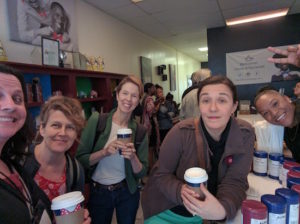 And then we broke for lunch! There were several options right there in the venue (which was fantastic, by the way, as was the organization of the event and how completely wonderful it was to be there) and we ended up having wraps and salads. After that was a browse in the pop-up bookstore, which was being put on by Orangeville’s Booklore. And then we needed tea, of course, so we went exploring historic downtown Brampton (including a band playing in the town square, the audience in comfy Muskoka chairs) to find T by Daniel, where we all partook in a cuppa and took a selfie of our crew.
And then we broke for lunch! There were several options right there in the venue (which was fantastic, by the way, as was the organization of the event and how completely wonderful it was to be there) and we ended up having wraps and salads. After that was a browse in the pop-up bookstore, which was being put on by Orangeville’s Booklore. And then we needed tea, of course, so we went exploring historic downtown Brampton (including a band playing in the town square, the audience in comfy Muskoka chairs) to find T by Daniel, where we all partook in a cuppa and took a selfie of our crew.
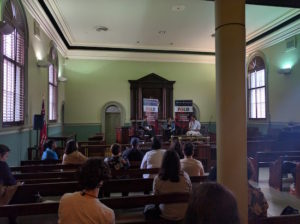 Which meant that we were late again for the next panel, Defying Boundaries, with Vivek Shraya, Chase Joynt, and Zoe Whittall. When we finally sauntered in, Shraya was discussing faith and queerness. Joynt began explaining that transness was not just about gender, but about the experience of finding kinship with wider communities. Both writers were asked about defying boundaries as mutual-media artists, and Shraya answers that while her foundation in music sometimes makes her feel like a fraud as a writer, that each form informs the others. Every form is limited, said Joynt, and it’s useful to be able to go beyond those limits.
Which meant that we were late again for the next panel, Defying Boundaries, with Vivek Shraya, Chase Joynt, and Zoe Whittall. When we finally sauntered in, Shraya was discussing faith and queerness. Joynt began explaining that transness was not just about gender, but about the experience of finding kinship with wider communities. Both writers were asked about defying boundaries as mutual-media artists, and Shraya answers that while her foundation in music sometimes makes her feel like a fraud as a writer, that each form informs the others. Every form is limited, said Joynt, and it’s useful to be able to go beyond those limits.
Both artists are also prolific collaborators. “Stories are more powerful with more voices involved,” explained Joynt, and Shraya noted the benefits of getting different perspectives on a project and learning to work with others. They’d been talking about this in regards to different approaches to social media. And Shraya remarked that for her, coming from a self-published, indie background, social media and self-promotion had never been a choice, which made it frustrating to have to listen to older authors complaining about this part of the job. She talked about the selfie as a political strategy for queer people of colour—what a radical act it was to take up space like that. She talked about moving from self-publishing to traditional publishing, and how while there are benefits (getting your books into bookstores being one), there’s still a lot of work required on the part of the artist. Joynt spoke about moving away from academic writing, and the freedom in that, and also about how he’s inspired by artists like Claudia Rankine and Maggie Nelson and their experimental citation strategies.
Joynt talked about his intent upon destabilization of trans narrative, and Shraya concurred: “If I’m going to transmit a narrative of femininity, it’s going to have hair.” When asked about her new book about racism, Shraya noted she was conscious of the privilege inherent in her experience in terms of anti-Black racism and First Nations racism, and she had to think about how to articulate her own complicity.
An audience member asked a question about trans narratives, and the prevalence of depressing themes, and Joynt expressed interest in the question of who gets to be fun. How do we account for the devastating impact of transphobia and give people room to be fun?
Joynt talked about memoir and the construction of story, and how his mom factored into it differently than other characters because she was the one stable force—his mom was always going to be his mom—and so he needed her permission to share her experience. Although Shraya’s take on this idea was very different—she hadn’t asked her mother about including her in the recent project, Trisha because she was going to do it anyway, so this way she didn’t have to go to the trouble of having her mother refuse her. And this all made me think about whether that kind of freedom goes both ways, and what kind of obligation a mother has to her child in regards to making art and telling stories. And was just one of the many additional questions that this fascinating panel led to.
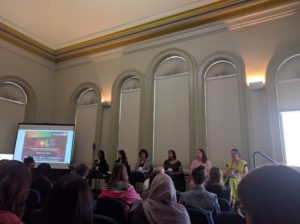 And then finally it was time for Publishing (More) Diverse Stories, with Anita Chong from Penguin Random House, Barbara Howson from House of Anansi, Bianca Spence from the Ontario Media Development Corporation, Rachel Thompson from ROOM Magazine, and Susan Travis from Scholastic Canada, moderated by the amazing Léonicka Valcius who’s even more fantastic in person than you’d expect (which is saying something). Truly a knockout panel, all of them, and I’d really been looking forward to this.
And then finally it was time for Publishing (More) Diverse Stories, with Anita Chong from Penguin Random House, Barbara Howson from House of Anansi, Bianca Spence from the Ontario Media Development Corporation, Rachel Thompson from ROOM Magazine, and Susan Travis from Scholastic Canada, moderated by the amazing Léonicka Valcius who’s even more fantastic in person than you’d expect (which is saying something). Truly a knockout panel, all of them, and I’d really been looking forward to this.
Chong responded to the first question, about her ideal diverse book publishing ecosystem, by explaining that we need a wider pool of readers. There is the typical reader (40-60, white, woman) but she’s not everyone. Those in publishing need a greater understanding of who readers are, and to that end, there needs to be a wider talent pool throughout the entire industry—not just writers or at the publisher level either.
Howson took on the question then of how to widen that readership, and the answer is to publish different voices to include new perspectives, younger people. She noted how difficult it is for people outside of a select socio-economic level to enter the industry, and would like to make it easier for them to do so.
Travis, who works in sales, spoke about broadening the variety of what she has to offer buyers (who are booksellers). Diverse has to mean substance—it’s not just about giving a kid in a picture book brown skin. She explained that buyers are cautious, that they tend to be old-guard, and that perhaps their caution is understandable given the realities of their industry. The people they’ve got working on the floor though, actually hand-selling the books, are more open-minded, and they’re the people that Travis approaches.
How to widen the pool then? Thompson spoke about her experiences at ROOM magazine, and efforts to transform their volunteer editorial board to reflect a more diverse make-up. She noted that an ideal landscape in terms of diversity would mean a magazine like ROOM (with a feminist mandate, publishing women) would not need to exist.
Spence reflected on the nature of arts funding, as well as the costs of getting into publishing via college or university publishing programs and/or internships, and wondered what would happen to the landscape and what kind of new perspectives might be discovered if these elite, expensive experiences were no longer regarded as pre-requisites for publishing careers.
Chong said that she’s so tired of being the only non-white person in the room, and that she continues to insist that inclusiveness doesn’t mean a lowering of standards. Widening the pool only means that you’re going to get something new. She spoke of her experience with the Journey Prize, and how she continually asks herself how she can run this program better. It’s about challenging your own expectations. For her, a solution was ensuring a diverse jury for the prize, and the results have only made the program stronger.
Howson talked about Groundwood Books, which has always had a diverse mandate, perhaps because its founder came from Guatemala and so brought with her another language and a different kind of point of view. And Groundwood has been publishing Spanish books and books from other cultures for years, which made the recent #WeNeedDiverseBooks movement a bit annoying from their perspectives in that they were being overlooked. And so to find a way to say, “Hey! We’re here!” they created a catalogue highlighting those diverse titles. Similarly, House of Anansi created Anansi International, looking for voices from around the world, and has a list of French Canadian titles.
It’s a question of finding and highlighting diverse voices, and working with marketers and the gatekeepers in stores to make it all happen.
Travis sees this as her job, keeping the conversations going, not just having diverse titles ghettoized, but having them integrated into stock. And making sure that conversation gets to the people who are actually selling the books, who are not necessarily store owners.
Spence says that as she is often the only person of colour in the room, she sees it as her job to ask tough questions to make people think about who gets included and why. She also likes to make connections with people just coming up in the industry and serving as an example, make connections and taking on mentorship roles. She encourages others in publishing to make their own connections with people of colour, to diversify networks and communities that way.
Thompson talked about the politics and diplomacy required in transforming communities. At ROOM, their focus was bringing in new people, a new diverse team. An example since then has been their Women of Colour issue, which was hugely successful—their call for submission went viral, and the issue entirely sold out. She’s hoping that their peers in the industry will undertake similar initiatives—they have had such success, but is left wondering why everybody else is so far behind.
Chong said that it all comes down to economics, and who can afford to be in the industry. There is one thing that we can all do though, which is to BUY THE BOOKS. Going to the library is not good enough. There is data about what sells, and if it sells, that data is irrefutable.
Spence said too that we have to make room for more diverse books. How come there can be twelve books about young white women working in the city, but only one Guatemalan book? To which Chong chimed in with annoyance at the way that diverse books are only read at certain times of year, like Black History Month, or Chinese New Year.
Howson noted though that even those who can’t afford to buy books can make a difference by using the library—ordering the books, putting on holds. The library is another place where the reader can demand diverse books.
Valcius added that it’s not all about data and economics though, and she is wary of the idea that it all comes down to the buyers and their agency. Because there are some books that don’t sell, but they still need to be published. Buying books is important, but it’s not all a numbers game.
“We publish poetry,” said Howson. “It’s not a numbers game.” But it’s still important to get a wide audience, to get the numbers up. And also to get books into schools. (Travis gave the example of BC schools’ changing curriculum and new demand for First Nations stories.)
Spence pointed out that writers need to be able to make money. That media outlets need to cover more books, and that shrinking coverage just means that everyone is reading the same 12 books. We need more diverse coverage of books. And that publishing salaries are pitifully low.
Writers these days need full-time jobs, says Chong, fearing for a point at which the only people who can afford to be writers are middle-class.
Thompson explains that ROOM has strategy for diversity now, and that everything they do is measured by it now. And funders are now asking for this to be part of programs, so it’s working for them, and enabling them to pay more people to work for the magazine, which widens their talent pool. They also have found themselves with increasing numbers of subscribers.
The panel took questions from the audience, many of whom were writers who felt the doors were closed to them. This idea was refuted by Chong, who noted how important it is for her to see diverse stories embraced for their universality, to see marginal stories brought into the centre. “There is a hunger for new voices,” she said. What these writers may be perceiving as a weakness isn’t necessarily so.
Spence brought up Shakespeare, and how readers are taught to push through the difficulty in accessing his work. Those picking up books by diverse writers need to be similarly encouraged to get past perceived difficulties such as dialect and find the universal.
“And talk about the universal,” said Howson. “That’s how you sell it.”
Valcius finished things up by suggesting it might help too to keep a sign hanging on the gate, one that says, “Hey, we’re open!”
AND SO. It was everything I hoped for and more. Panelists Nawaz, Dimaline and Joynt sold their books to me by virtue of their stellar presentations. I bought others I’ve been looking forward to reading. I came away inspired and full of questions and ideas, and I’m not the only one. Kudos for Jael Richardson and Léonicka Valcius, two incredible women, for making it all happen, with the help of their fantastic team and their great volunteers. And what I’ve written here only represents one day of three days of programming, not to mention the other panels, workshops and events that were taking place on Saturday while we were there.
So yes, this was a big deal. Hopefully the start of something bigger.
“So often on a panel I am the token. It’s exciting how much more nuanced the conversation is when there are many diverse voices,” tweeted Vivek Shraya after the fact, and it’s so entirely true. The difference for those of us who were there was entirely palpable.
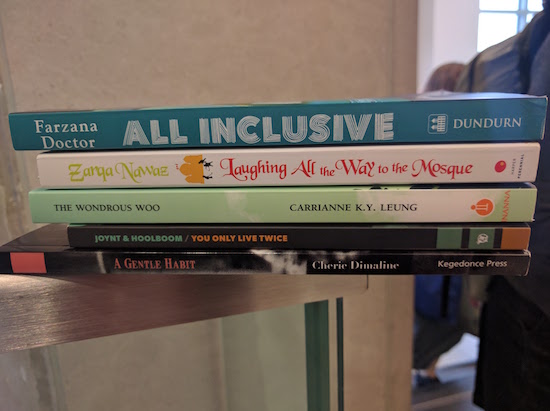
April 26, 2016
Authors for Indies on Saturday
Come and let me sell you all the books. I’ll be at Book City Danforth, and it’s going to be terrific. If you’re not in the neighbourhood, check out the Authors for Indies site to find out what’s going on near you.
April 12, 2016
April 30: Authors for Indies

I still remember what it felt like to take for granted the bookstore that was located within a five minute walk from my house. To have it suddenly occur to me mid-morning that I was yearning for a copy of, say, The Mystery of the Shopping Cart, by Anita Lahey, and then to just venture out and get it. To ask the clerk at the counter if they had a copy—because it’s a collection of essays, poetry, and criticism, and I couldn’t imagine where such a book could be found in the shop, and because it’s a small press title, the slim kind that can get lost easily amongst bigger books—to be told that they had two. And then there it was: the book I wanted in my hands. Could there be a more efficient system?
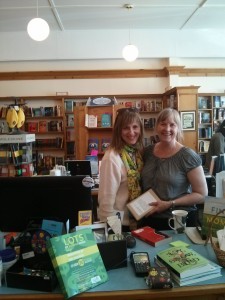
The lovely people of Blue Heron Books in Uxbridge.
I was spoiled. I was. Because even now, two years after Book City closed their Annex location and left Bloor Street bookless, I am feeling the loss, even with the excellent bookstores still in our midst: I frequent Bakka Phoenix Books and Parentbooks on Harbord Street, and Little Island Comics on Bathurst is a kidlit oasis, and while I am so glad that these speciality stores have found their niche and continue to survive, I miss the generalness of Book City.
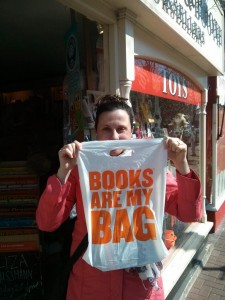 I miss a bookstore that specialized in everything: new releases, award-winners, mid-list titles, thrillers, memoirs, CanLit, non-fiction, and small press gems. I miss the discovering of walking around Book City’s shelves and tables: I still remember the excitement of discovering a new Margaret Drabble release I hadn’t heard of; and I remember going in to pick up Zadie Smith’s NW on its release date in 2012; or the day I bought The Goldfinch. I remember years ago when I didn’t have money to buy books as prolifically as I now do, and what it meant to hold these books, to want them and wait for them. I remember when my husband was unemployed and I didn’t buy new books for ages, and then he got a new job, and Book City purchases were the first ones I made and it felt so good—so you see, I wasn’t always taking it for granted. I always knew how lucky I was. Maybe what I mean by taking it for granted instead is that it was just so imaginable that it could possibly end.
I miss a bookstore that specialized in everything: new releases, award-winners, mid-list titles, thrillers, memoirs, CanLit, non-fiction, and small press gems. I miss the discovering of walking around Book City’s shelves and tables: I still remember the excitement of discovering a new Margaret Drabble release I hadn’t heard of; and I remember going in to pick up Zadie Smith’s NW on its release date in 2012; or the day I bought The Goldfinch. I remember years ago when I didn’t have money to buy books as prolifically as I now do, and what it meant to hold these books, to want them and wait for them. I remember when my husband was unemployed and I didn’t buy new books for ages, and then he got a new job, and Book City purchases were the first ones I made and it felt so good—so you see, I wasn’t always taking it for granted. I always knew how lucky I was. Maybe what I mean by taking it for granted instead is that it was just so imaginable that it could possibly end.
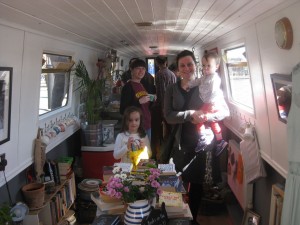
A bookshop on a boat—why not?
If there is a bright side to the closure of my local, however, it’s that it’s inspired me to take up Bookshops as destination travel. With a store like Book City no longer at arm’s reach, it’s up to me to seek them out, and so we do: a trip to the East or West end now inevitably brings a stop at the Book City locations in those areas; we make day trips to places like Blue Heron Books in Uxbridge (which was definitely worth the journey, and we’re going to do it again this summer); and a year ago we spent two weeks in England visiting one amazing bookshop after another. Because there is no better way to travel.
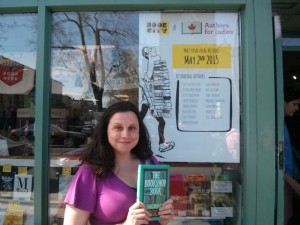
Last year at Authors for Indies
And now I’m exciting to be making another bookshop my destination, although I’m not the only one. On April 30, I’ll be taking part in the second annual Authors for Indies Day and pushing titles at Book City on the Danforth (348 Danforth Avenue) between 4 and 5pm. I did this last year and it was ridiculous fun, to meet other readers and connect them with books they’re totally going to love, and just to be in a bookshop (which really is my natural environment). So I hope you’ll come and browse with me, and we can talk books, and love books, and buy them too, supporting these shops that mean so much to our communities and without whom our streetscapes would be so much bleaker.
See you there?
And find out what Authors for Indies events are happening in your neighbourhood.
November 16, 2015
Me and Mitzi Bytes at Draft 11.1
 I’m very excited to let you know that I’m taking part in the 10th Anniversary Celebrations of the Draft Reading Series next Sunday, November 22 from 4pm-8pm at the Paintbox Bistro. The theme of the event is Process Product and Power: This is Not ‘So You Think You Can Write’. I’ll be reading from my draft (fittingly) of my forthcoming novel, Mitzi Bytes, my very first time airing her laundry in public, and also taking part in a panel discussion on mistakes, which, as a noted imperfectionist, I know quite a bit about. I’ll also be bringing copies of The M Word to sell. Other guests for the event include Karleen Pendleton Jiménez, Fides Krucker, Ron Edding, Bryan Ibeas, Mary Newberry, and Ewan Whyte. Hope to see you there!
I’m very excited to let you know that I’m taking part in the 10th Anniversary Celebrations of the Draft Reading Series next Sunday, November 22 from 4pm-8pm at the Paintbox Bistro. The theme of the event is Process Product and Power: This is Not ‘So You Think You Can Write’. I’ll be reading from my draft (fittingly) of my forthcoming novel, Mitzi Bytes, my very first time airing her laundry in public, and also taking part in a panel discussion on mistakes, which, as a noted imperfectionist, I know quite a bit about. I’ll also be bringing copies of The M Word to sell. Other guests for the event include Karleen Pendleton Jiménez, Fides Krucker, Ron Edding, Bryan Ibeas, Mary Newberry, and Ewan Whyte. Hope to see you there!
